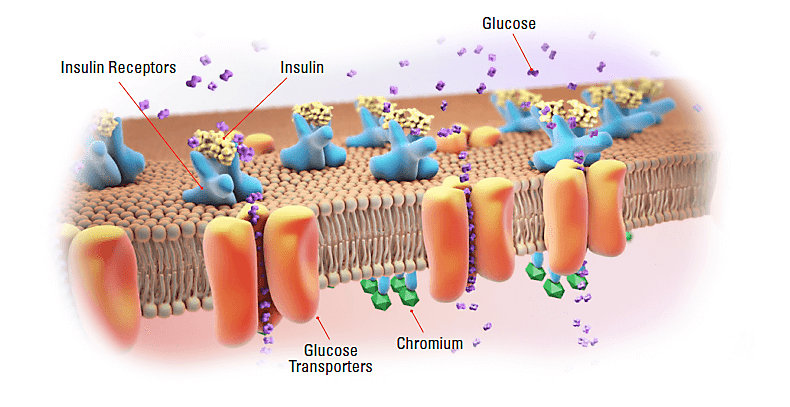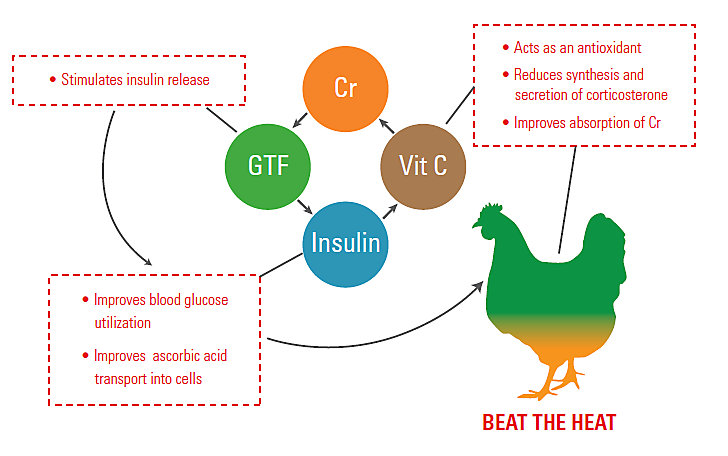You are viewing South Asia
- United States
- Canada
- Mexico
- South America
- EMENA
- Sub-Saharan Africa
- Russia
- South Asia
- Asia Pacific
- China
- Global
Choose Your Location:
- United States
- Canada
- Mexico
Popular Searches
- Animal Nutrition & Health
- CHROMFLEX™ C
CHROMFLEX™ C
CHROMFLEX™ - C, with its unique combination of chromium propionate and coated Vitamin C, enhances immunity, growth rate, production and livability by reducing blood glucose level to combat ill effects of heat stress.
What is heat stress in poultry? How does heat stress affect poultry?
Heat stress is a condition in which birds find it difficult to achieve the balance between body heat production and body heat loss.
Normally, body temperature of birds varies between 40 to 42°C. The ideal environmental temperature for chickens is 18 to 24°C. If there is increase in environmental temperature, body temperature also rises. In order to maintain the body temperature of 40 to 42°C, birds lose heat through radiation, convection, conduction and evaporation.
Since birds’ skin doesn’t have sweat glands, heat loss mainly happens through evaporation by panting. In order to lose 1 ml of water, birds use 540 calories of energy, resulting in significant drop in production and weight. Other adverse effects of heat stress often seen in poultry layer birds are high mortality, decreased feed intake, lower-than-expected body weight gain, poor feed efficiency, reduction in egg production and poor eggshell quality.
Physiology of heat stress:
The endocrine mechanism of stress regulation starts with the stimulation of hypothalamus and release of Adrenocorticotropic hormone (ACTH) from the anterior pituitary. This causes an increase of adrenal cortical steroid secretions in the bird. Continuous stimulation to the adrenal cortex leads to chronically high levels of corticosteroid hormone. This hormone is responsible for the formation of glucose from body's reserve of carbohydrates, lipids and proteins. Corticosteroids hamper insulin production and make body cells insensitive to insulin, which results in high blood glucose levels. Corticosteroids contribute to many of the disease associated with long-term stress, such as cardiovascular and gastrointestinal disease, hypercholesterolemia, metabolic rearrangements, and antibody suppression.

How does CHROMFLEX™ - C reduce ill effects of summer stress?
The combination of chromium and Vitamin C in CHROMFLEX™ - C has been found to give significant improvement over individual ingredients on performance of poultry. Chromium and Vitamin C work synergistically to combat the ill effects of heat stress. Chromium is a part of Glucose Tolerance Factor (GTF), which helps to stimulate the insulin release, leading to better utilization of blood glucose. Chromium also helps in Vitamin C transportation through RBC. Vitamin C acts as an antioxidant and prevents oxidative stress. It helps to reduce the secretion of stress-releasing hormone, cortisol. It also helps in chromium absorption.

Proven efficacy of CHROMFLEX™ - C in reducing oxidative stress
In house demonstration using CLS demo kit to compare the efficacies of Chromeflex™ - C and other similar products clearly emphasize the effectiveness of Kemin’s product in reducing oxidative stress. Initially, when water and few drops of oxidizing agent are added to poultry feed in the beakers, mixtures oxidize because of lack of Vitamin C. Subsequently, when an herbal product is added to the respective beaker, the solution retains its color, indicating that product has relatively no effect on free radicals produced during heat stress. On contrary, when Chromflex™ - C is added to the beaker, coated Vitamin C prevents oxidation of feed nutrients, proving superior anti-oxidation property of the product in mitigating heat stress.
Benefits of CHROMFLEX™ - C
- Reduces ill effects of heat stress
- Enhances immunity, growth rate
- Minimizes the disease outbreak
- Reduces mortality caused by heat stress
- Improves egg production and egg shell quality
- Enhances feed intake
- Prevents weight loss
Contact Kemin Animal Nutrition & Health - India
- California Supply Chain Act
- Email Disclaimer
- GDPR Personal Data Addendum
- General Terms & Conditions for Vendors
- Global Environmental Policy Statement
- Indirect Cost Estimates
- Kemin Terms & Conditions
- Modern Slavery Act Transparency Statement
- Privacy Policy
- Sitemap
- Change Cookie Consent
- Animal Welfare Statement
© Kemin Industries, Inc. and its group of companies all rights reserved. ® ™ Trademarks of Kemin Industries, Inc., USA
Certain statements may not be applicable in all geographical regions. Product labeling and associated claims may differ based upon government requirements
